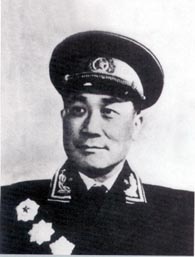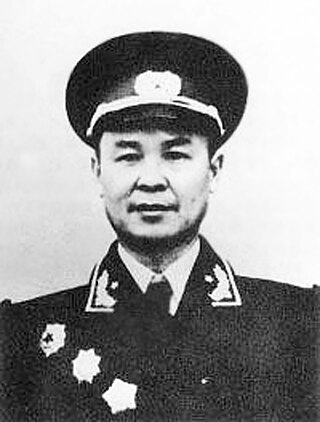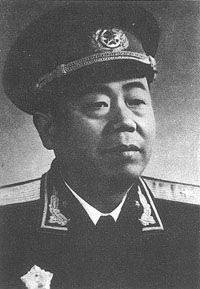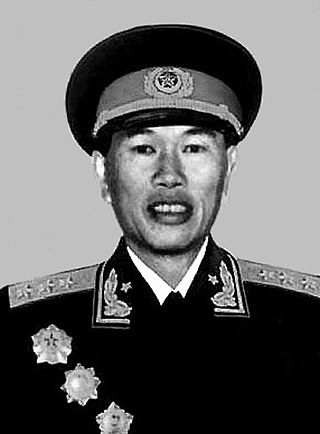
The Chinese Civil War was fought between the Kuomintang-led government of the Republic of China and the forces of the Chinese Communist Party, with armed conflict continuing intermittently from 1 August 1927 until 7 December 1949, resulting in a Communist victory and subsequent control of mainland China.

Liu Bocheng was a Chinese military commander and Marshal of the People's Liberation Army.
Group armies or army groups or combined corps, which are army-level military formations of the People's Liberation Army Ground Force of China.

Han Xianchu was a general of the Chinese Communist Party. Han participated in many military campaigns and battles such as Battle of Pingxingguan, Liaoshen Campaign, Pingjin Campaign, Hainan Campaign, and the Korean War. In 1955 he was among the first group of military leaders to be awarded the Shang Jiang rank.

Zhang Guohua was a Chinese lieutenant general and a politician, serving during the invasion of Tibet and the Sino-Indian War and later as a Communist Party secretary for the Tibet Autonomous Region.

Xu Shiyou was a general in the Chinese People's Liberation Army.

Wei Guoqing was a Chinese government official, military officer and political commissar of Zhuang ethnicity. He served as the Chairman of Guangxi from 1958 to 1975 and on the Chinese Communist Party's Politburo (1973–1982) and as Director of the People's Liberation Army's General Political Department (1977–1982). Wei was one of the few members of the 9th, 10th, 11th and 12th Central Committees (1969–1987) and the 10th through 12th politburos not purged during the Great Proletarian Cultural Revolution (GPCR) or Deng Xiaoping's backlash. He was also a Vice Chair of the National People's Congress Standing Committee (1975–1989) and of the Chinese People's Political Consultative Conference (1964–1983).

Nie Fengzhi was a general of the People's Liberation Army Air Force (PLAAF) of the People's Republic of China.

Xiao Jinguang was a revolutionary and military leader, one of the main leaders of the Red Army and the People's Liberation Army, and one of the ten senior flag officers of the PLA and the only Fleet Admiral in PLA Navy history.

Deng Hua was a general in the Chinese People's Liberation Army. He was the Deputy Commander of the People's Volunteer Army. After Marshal Peng Dehuai returned to China for medical treatment, Deng Hua became the Acting Commander and Political Commissar.

Yang Yong was a general in the People's Liberation Army of China. He served as the secretary of the Secretariat of the Chinese Communist Party between September 1982 and January 1983, and governor of Guizhou, from January 1950 to April 1951.

The 19th National Congress of the Chinese Communist Party was held at the Great Hall of the People, Beijing, between 18 and 24 October 2017. 2,280 delegates represented the party's estimated 89 million members. Preparations for the 19th National Congress began in 2016 and ended with a plenary session of the Central Committee a few days prior to the Congress. In 2016, local and provincial party organizations began electing delegates to the congress as well as receiving and amending party documents. It was succeeded by the 20th National Congress of the Chinese Communist Party.
The 53rd Division was created in February 1949 under the Regulation of the Redesignations of All Organizations and Units of the Army, issued by Central Military Commission on November 1, 1948, basing on the Independent Brigade of Yuwansu Military District, formed in December 1946.
The 11th Corps was a military formation of the Chinese People's Liberation Army. It was active from 1949 to 1952, with a six month break; and from 1969 to the end of 1985. It is currently inactive. In 1979 the corps took part in the Sino-Vietnamese War. In 1984 it again fought in Vietnam. It was stationed in the Kunming Military Region.
The 184th Division was created in February 1949 under the Regulation of the Redesignations of All Organizations and Units of the Army, issued by Central Military Commission on November 1, 1948, basing on the 43rd Brigade, 15th Column of Huabei Military Region. Its history could be traced to 18th Military Sub-district of Taiyue Military District formed in 1946.
The 24th Army was a military formation of the People's Liberation Army. It was established in February 1949 and finally disbanded circa 2000–2003.
The 6th Corps(Chinese: 第6军) was a military formation of the Chinese People's Liberation Army existed from 1949 to 1952.
The First Field Army of the Chinese Communist Party was a military formation in the last stages of the Chinese Civil War (1949–1950).

The Second Field Army (第二野战军), initially known as the Central Plains Field Army (中原野战军) or the Liu-Deng Army, was a major military formation of the Chinese Communist Party during the last stages of the Chinese Civil War.
Niu Zhizhong a former officer in the People's Armed Police of China. At the height of his career, he served as deputy commander of the People's Armed Police. He was an alternate member of the 18th CPC Central Committee. He was expelled from the Communist Party in 2016.











